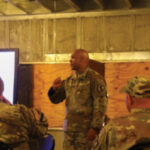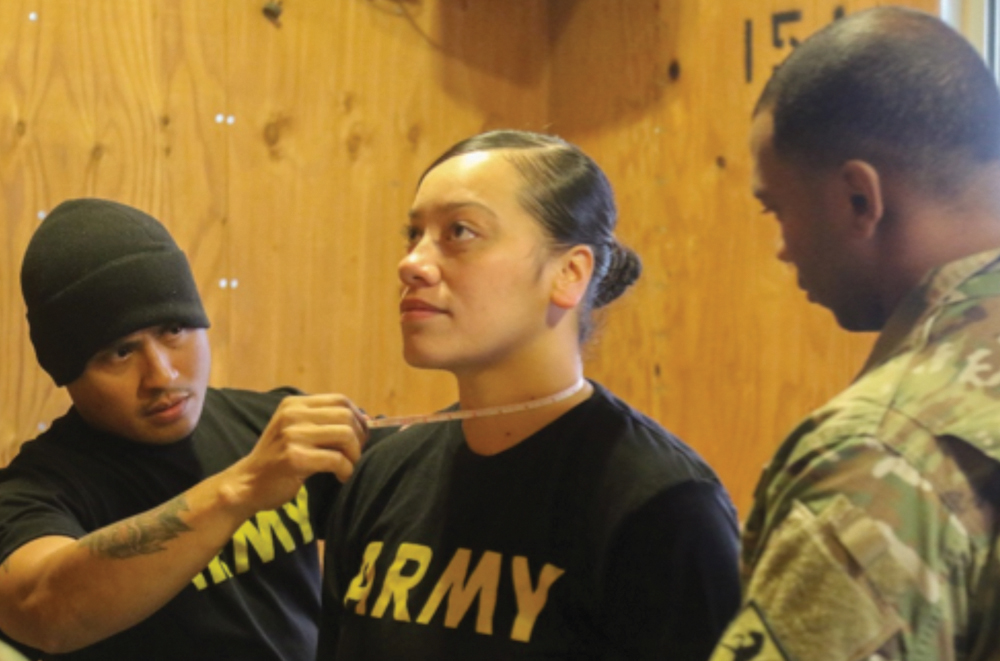FORT IRWIN, Calif. — The Non-Commissioned Officers Corp is considered the backbone of the United States Army. Our NCOs work diligently to enforce the rules and regulations of the Army we have today. However, Senior Non-Commissioned Officers still have to train up the future NCOs and teach them how to conduct themselves on any echelon of staff within the Army as they rise through the ranks. This training can include a range of things such as creating and conducting briefs, cyber certificate training or a unit level NCO Academy to refresh the knowledge base.
Over the week of Dec. 2, the Regimental Support Squadron, 11th Armored Cavalry Regiment, led by Sgt. Maj. Herman Estrada III, held an NCO Academy in the training city of Razish, National Training Center and Fort Irwin, California. This academy hosted a collection of six classes ranging from the Army Body Fat Composition Program, Equal Opportunity, Sexual Harassment/ Assault and Response Prevention Program, and more. This gave the NCOs that attended the proper knowledge on how to conduct the proper course of action in the different cases presented. The scenarios taught from these programs will give them better insight on the warning signs and how to prevent them before causing problems within their sections, Troops, Squadrons, or Regiment.
The ABCP course was instructed by Master Sgt. Sheila Edwards and 1st Sgt. Jeremy Toney. This class gave the NCOs lessons on how to properly perform a tape test to soldiers, as well as the proper procedure of filling out DA Form 5500 (Male Body Fat Percentage) and DA Form 5501 (Female Body Fat Percentage). Master Sgt. Edwards informed the NCOs on the FLAG Program; this program is for soldiers who fail their physical training test or tape test and restricts soldiers until they can pass either one. This re-education proved to be important to the NCOs because as a senior NCO, it is their job to understand the importance of physical training and know how to properly tape and flag someone if they were to fail the tape or physical fitness test.
The Equal Opportunity instruction plays a vital role in NCOs as they become more distinguished leaders, along with molding junior Enlisted soldiers to become leaders themselves. During the academy, the attendees were presented with a refresher course on the Army’s Equal Opportunity program. Equal Opportunity is a vital pillar upon which the Army Values are formed; you must respect all people which you interact with as an NCO.
The Sexual Harassment/ Assault and Response Prevention Program brings light to the issues that not only women but men face as well in the Army. The Army has a zero-tolerance policy for Sexual Harassment and Sexual Assault. This course shed light on the culture surrounding SHARP and how to notice warning signs early before they take a turn for the worst. This is another vital course for NCOs, as being a leader and having soldiers assigned to you can be a difficult task. No leader wants to see their soldiers become a victim or even a suspect of sexual harassment or sexual assault. Knowing the warning signs can prevent a situation from arising in the first place.
The NCO Academy conducted by RSS, 11th ACR, successfully refreshed the minds of the NCOs that attended as well as expanded on the knowledge they already had on the subjects presented. Sgt. Maj. Estrada plans to open the NCO Academy across the Regiment in the near future. Expanding on the curriculum taught and bringing in more NCOs. Sgt. Maj. Estrada also plans on adding Section Leaders to the list of attendees’ in order to groom them for when they become NCO with soldiers assigned to them. This will open a wide variety of training to NCOs across the Regiment, enabling them to open their mind to new ideas of teaching and coaching the soldiers assigned to them. The NCO Academy can become a vital part of the Regiment in the future and hopefully the Regiment will be open to holding an Academy for the other Squadrons’ NCOs to attend. As we all know the Non-Commissioned Officers Corp is the backbone of today’s Army, and they help shape the future of the Army and bring in a new kind of enlisted leadership.













